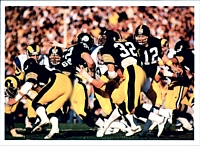1979–80 NFL playoffs

The Steelers playing against the Rams in Super Bowl XIV.
|
|||
| Dates | December 23, 1979–January 20, 1980 | ||
|---|---|---|---|
| Teams | 10 | ||
| Defending champions | Pittsburgh Steelers | ||
| Champions | Pittsburgh Steelers | ||
| Runners-up | Los Angeles Rams | ||
| Matches played | 9 | ||
|
|||
The National Football League playoffs for the 1979 season began on December 23, 1979. The postseason tournament concluded with the Pittsburgh Steelers defeating the Los Angeles Rams in Super Bowl XIV, 31–19, on January 20, 1980, at the Rose Bowl in Pasadena, California.
Within each conference, the three division winners and the two wild card teams (the top two non-division winners with the best overall regular season records) qualified for the playoffs. The three division winners were seeded 1 through 3 based on their overall won-lost-tied record, and the wild card teams were seeded 4 and 5. The NFL did not use a fixed bracket playoff system. In the first round, dubbed the wild-card playoffs or wild-card weekend, the fourth seed wild card hosted the fifth seed. All three division winners from each conference then received a bye in the first round. The second round, the divisional playoffs, had a restriction where two teams from the same division could not meet: the surviving wild card team visited the division champion outside its own division that had the higher seed, and the remaining two teams from that conference played each other. The two surviving teams from each conference's divisional playoff games then meet in the respective AFC and NFC Conference Championship games, hosted by the higher seed. Although the Super Bowl, the fourth and final round of the playoffs, was played at a neutral site, the designated home team was based on an annual rotation by conference.
The Oilers managed to shut down the Broncos offense for most of the game en route to a 13–7 win, holding the Broncos to 216 yards and recording six sacks.
After Toni Fritsch kicked a 31-yard field goal on Houston's first drive, Denver marched 80 yards in 13 plays to score on quarterback Craig Morton's 7-yard touchdown pass to running back Dave Preston. From that point on, the Oilers controlled the rest of the game. With less than 3 minutes left in the first half, Houston advanced 74 yards to score on running back Earl Campbell's 3-yard touchdown run. Although Campbell and starting quarterback Dan Pastorini both missed the second half with injuries, the Oilers defense continued to dominate. In the fourth quarter, a 15-yard interception return by linebacker Gregg Bingham set up Fritsch's 20-yard field goal with 4:18 left in regulation.
...
Wikipedia
